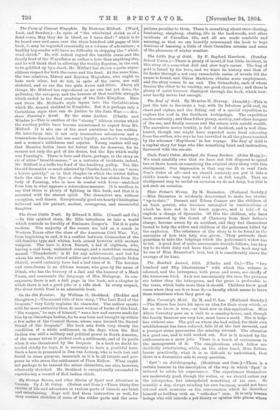The Curse of Clement Waynjtele. By Bertram Mitford. (Ward, Lock,
and Bowden.)—In spite of "the whirlwind shriek as of a fiend voice, May they die in blood, as I have died " which is to be heard ever and anon over the three hundred odd pages of this book, it, may be regarded essentially as a volume of adventure ; a healthy boy-reader will have no difficulty in skipping the " whirl- wind shriek." He will indeed regard the terrible curse and the family feud of the Waynfletes as rather a bore than anything else, and he will think that in allowing the worthy Royston, in the end, to be gobbled up by a shark, Mr. Mitford has shown a quite super- stitious respect for both the curse and the feud. At the same time, the two relatives, Eldred and Royston Waynflete, who ought to hate each other, but do not, in spite of the curse, are well sketched, and so are the two girls Avice and Olive. Above all things, Mr. Mitford has reproduced as no one has yet done, the gallantry, the savagery, and the horrors of that terrible struggle which ended in the final crushing of the Zulu Kingdom. Here and there Mr. Mitford's style lapses into the Corinthianism which Mr. Arnold disliked in Kinglake. But it is perhaps only a Corinthian style that can do justice to the Zulu War.—Ren- shaw Fanning's Quest. By the same Author. (Chatto and Windus )—This is another of the "strong" African stories which the reading public have become accustomed to expect from Mr. Mitford. It is also one of the most ambitious he has written He introduces into it not only tremendous adventures and a tremendous diamond, but one man's loyalty, another's treachery, and a woman's selfishness and caprice. Young readers will say that Maurice Sellon fares far better than he deserves, for he secures not only the girl of his desire, but the Eye which really was Fanning's. There is here and there, perhaps, in the story an air of ultra-" breathlessness ; " as a narrator of incidents, indeed, Mr. Mitford is a trifle too fond of the headlong gallop. Yet, like the old dramatist so much admired by Charles Lamb, he can " move a horror quickly," as in that chapter in which the traitor Sellon .finds the clue to the Eye—a Clue which he has stolen from the body of Fanning, who is hors de combat with fever—snatched from him in what appears a miraculous manner. It is needless to say that there is plenty of fighting in this book, and that it is narrated with the utmost spirit. The characters are, without exception, well drawn. Exceptionally good are hearty Christopher 'Bellwood and his patient, modest, courageous, and resourceful daughter.






































 Previous page
Previous page